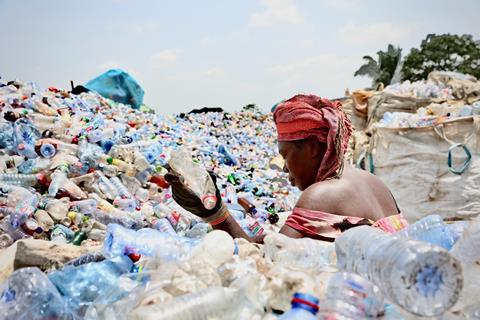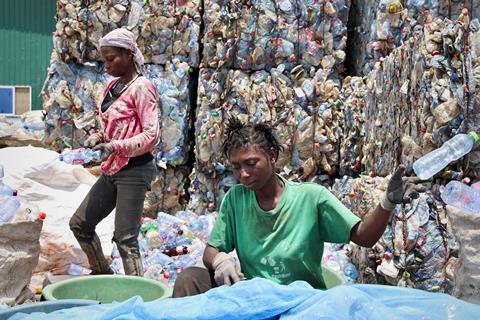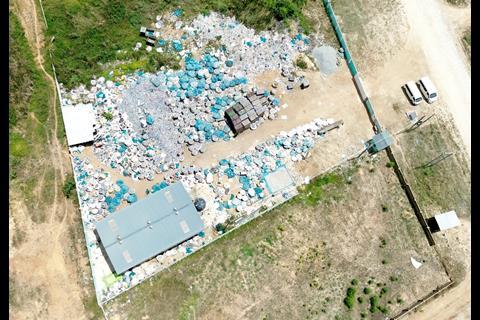The food industry is the single biggest user of plastics, and if it is serious about finding solutions to plastic waste, it must work together and innovate. Here is what the Fresh Produce Impact Hub (FRESHPPACT) is doing to make that happen
Solving the world’s greatest challenges while running a business is no easy to task. And yet, increasingly, this is exactly what we are expected to do. More than ever before, there is pressure from governments, investors, customers and our own sense of responsibility to act on big issues like climate change, biodiversity loss, resource depletion and poverty. We are faced with a raft of emerging ESG and mandatory reporting requirements that are stretching our capacity just at a time when our capacity is running out.
One such issue is plastics. Globally, we generate nearly 400 million tonnes of plastic waste a year, with only nine per cent being recycled. Most of this waste ends up in landfills where plastics either leak into the oceans or remain in the soil for hundreds of years, creating significant environmental and health risks.
Where plastics are incinerated, pollutants and hazardous toxins are released into the environment, which reduces air quality and poses a significant risk to health. The food industry is the single biggest user of plastics and was responsible for 146 million tonnes of plastic in 2015 alone. This is several times more than the next two industries put together.
If we are serious about finding solutions that address the scale of the social and environmental issues we all face, then we have to work together. Reducing emissions to net zero is not something that can be achieved by simply installing solar panels, and we cannot prevent plastic pollution by just recycling more. Addressing these challenges demands radical thinking and ground-breaking innovation, something that cannot be realised by one business alone. To attain the necessary scale of impact, we need seismic change, and this can only be achieved though effective collaboration.
Prepared fruit producer Blue Skies launched the Fresh Produce Impact Hub (FRESHPPACT) in 2022 to find ground-breaking innovation through industry collaboration. It was founded on the premise that while businesses like Blue Skies have a strong desire to find and implement solutions, they lack the resource and the R&D budgets to be able to act alone.
Funded by a UKAID grant through the Sustainable Manufacturing and Environmental Pollution Programme (SMEP), FRESHPPACT brings together retailers, manufacturers and agribusinesses operating within food supply chains rooted in developing or emerging economies. Its purpose is to identify shared high-priority social and environmental challenges and work with research partners to accelerate the adoption of the most promising solutions through a process of rapid evaluation, testing and adoption.
In its first year, FRESHPPACT created an operating model and built its consortium to over 10 members, including Waitrose & Partners, Blue Skies, Primafruit, HPW, the Fresh Produce Consortium, The Food People, Reading Scientific Services (RSSL), and the University of Nottingham. It has also appointed the University of Northampton’s Centre for Sustainable Business Practices (CSBP), as it’s Coordinating Research and Project Management Partner.
In July 2022, FRESHPPACT launched a call for proposals to find solutions to mitigate pollution caused by plastics in Ghana, where Blue Skies has its biggest processing operations. It centred on three key challenge areas that were defined in consultation with consortium members, namely plastics used in packaging, workwear (or PPE), and agricultural mulch.
While we are increasingly familiar with single-use plastics used in packaging, and we have arguably become more familiar with how far plastics are used in PPE (mainly in health care settings as highlighted by the recent pandemic), the wider public is possibly not so aware of the extent to which plastics are used in agriculture. For example, plastic mulch is commonly used in pineapple cultivation as it helps to retain moisture and suppress weeds, thereby reducing the need for irrigation and herbicides. However, once used it is notoriously difficult to remove and often ends up being ploughed back into the soil where it eventually breaks down into micro plastics. A recent UN report suggests there could be more plastics in our soils than in the oceans. Clearly, agricultural plastics presents a massive problem that must be urgently addressed.
So, what kind of solutions can we look to? FRESHPPACT works by attempting to ‘join the dots’. This means connecting organisations that have shared challenges with the funders, innovators, entrepreneurs and researchers who can help to solve them, while ensuring solutions do no harm, offer maximum opportunity for social inclusion and gender equality, and have no unintended consequences. Following the first call for proposals, FRESHPPACT has shortlisted five solutions which could provide the answers that consortium members are looking for. These are:
- A mechanical mulch lifter from Data Solutions Hub that can remove plastic mulch from soils to enable it to be recycled.
- Agricultural mulch made by Ghanaian startup ‘Coco360’ that is derived from organic waste such as coconut coir to replace the use of plastics.
- Compostable workwear from Gaia Biomaterials made from a biobased material called biodolomer.
- Paper-based cellulose pouches made by the University of Greenwich NRI in partnership with Sirane, to replace single-use plastic trays for fresh cut fruit.
- Plant-based coatings and films derived from seaweed made by UK-based start-up Kelpi.
The organisations behind these innovations travelled to Ghana in February this year to conduct further research. You can find out more about the trip here.
These solutions will now go through a process of additional development and commercial testing and those that are successful and prove to be economically viable will go on to receive further funding so that they can be scaled up and widely adopted. It is our collective aim to find solutions that can be scaled for impact. It is no good if what we learn is only reserved exclusively for a select few. To change the world, we need to tell the world what we have discovered and encourage others to do the same.
Solving the world’s greatest challenges while running a business is no easy to task, but when we work together and collectively focus on finding solutions, then anything is possible.
The Fresh Produce Impact Hub is free to join. To find out more and to get in touch, visit www.freshppact.org.
The author of this piece, Simon Derrick, is global head of sustainability at Blue Skies.






